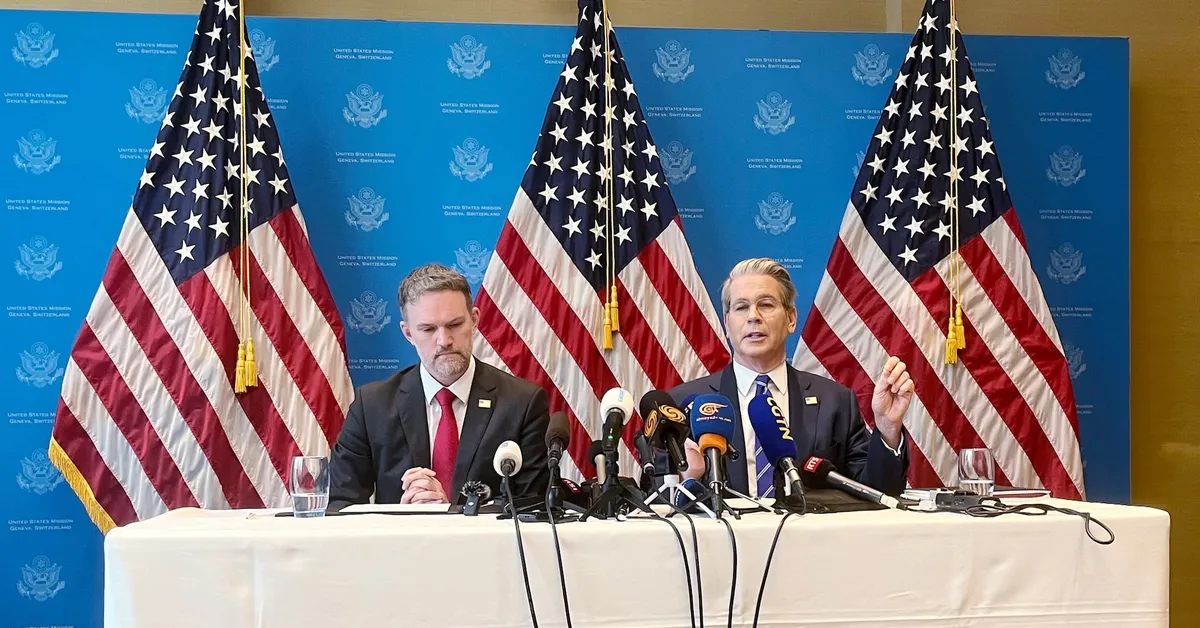
LONDON/SHANGHAI, May 12 (Reuters) - In a significant development for the global economy, stocks and the US dollar experienced a notable surge on Monday after the United States and China announced a 90-day pause on tariffs. This agreement, which includes a sharp reduction in reciprocal duties, has instilled a sense of confidence among investors, suggesting that a full-scale trade war may have been averted.
U.S. Treasury Secretary Scott Bessent revealed the details of the agreement following discussions with Chinese officials in Geneva. He stated that both nations had reached a deal, as highlighted in a joint statement, which indicated that reciprocal rates would decrease by a significant 115 percentage points. This weekend marked the first face-to-face interactions between U.S. and Chinese officials since President Donald Trump initiated a global tariff blitz aimed primarily at China.
In terms of market reaction, the foreign exchange market saw the dollar extend its gains. The euro dipped by 1.2%, trading at $1.1164, while the Japanese yen weakened, leading the U.S. dollar to rise by 1.6% to 147.715. In the bond market, benchmark 10-year U.S. Treasury yields increased by 7 basis points to reach 4.44%, following a prior increase of 5 basis points before the joint statement was released.
Jan von Gerich, Chief Market Analyst at Nordea in Helsinki, expressed a cautious perspective, stating, "Markets have taken it at face value, but I personally am a bit skeptical. If the goal is to achieve lower tariffs, then why approach it in this manner? Uncertainty remains elevated, and I worry that further complications may arise as details are finalized." Von Gerich emphasized the importance of not taking the current situation at face value, recalling the previous market volatility following the 'Liberation Day' tariff announcement on April 2.
Jane Foley, Head of FX Strategy at Rabobank in London, highlighted that the market had already begun reacting in anticipation of the tariff pause. "The dollar is now being viewed as a risky asset and is gaining strength. There is optimism that the ongoing negotiations between the U.S. and China will not lead to a decoupling of their economies," she noted. However, Foley cautioned that the overall scenario is still uncertain, with concerns about the long-term impacts of tariffs on global growth and central bank policies.
Kenneth Broux, Senior Strategist for FX and Rates at Société Générale in London, remarked on the apparent de-escalation between the U.S. and China, noting that tariffs on Chinese goods would drop to 30%, while Chinese tariffs on U.S. goods would decrease to 10%. "This is a clear vote by the market in favor of riskier assets and a positive sign for the U.S. economy," he stated. Broux indicated that the dollar has lagged behind other markets in recovering from the lows seen in April, but current conditions suggest a potential for a stronger comeback.
Zhiwei Zhang, Chief Economist at Pinpoint Asset Management in Hong Kong, expressed positivity about the agreement, stating, "This is better than I expected. The reduction in tariffs is much lower than anticipated, which is favorable for both countries and the global economy." However, he reminded investors that this is only a temporary measure, and the two sides will need months to finalize a comprehensive trade deal.
Arne Petimezas, Director of Research at AFS Group in Amsterdam, reflected on the unexpected U-turn by the U.S. on tariffs, suggesting that while the temporary reduction is a positive development, it raises questions about the future of tariff policies once the 90-day pause concludes. "The markets should rally on this news, but the real test will come after the pause ends," he stated.
William Xin, Chairman of Hedge Fund Spring Mountain Pu Jiang Investment Management in Shanghai, noted that the outcome of the negotiations has exceeded market expectations. "The market had been fragile, and now there is more certainty. Both Chinese stocks and the yuan are likely to experience an upswing for some time," he concluded.
This agreement marks a pivotal moment in U.S.-China relations and has the potential to significantly influence global economic dynamics in the coming months.